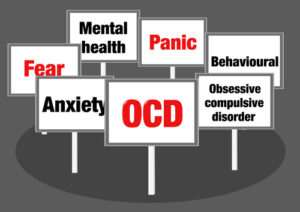OCD is a mental disorder that affects how a person thinks, feels, and behaves. It’s characterized by persistent and repeated thoughts, images, or impulses that are difficult to control and cause significant distress. If you’re unlucky enough to have it, you know all too well what it’s like to live in a constant state of fear and dread. For those of us with this disorder, the thought of one stray thought can send our anxiety into overdrive. In this blog post, we will discuss some of the common causes of OCD worsening, as well as some tips on how to cope with it. From breathing exercises to medication management, read on for everything you need to know about managing OCD effectively.
Contents
What is Obsessive Compulsive Disorder?

Obsessive Compulsive Disorder (OCD) is a mental disorder that occurs when a person has recurrent, intrusive thoughts (obsessions) and compulsive behaviours (compulsions) that cause significant distress or impairment. These thoughts and behaviours must be performed in response to an obsession, or as a result of an urge to neutralize an unpleasant feeling. The obsessions may relate to feared objects or situations, cleanliness, symmetry, or certain routines. The compulsions may include checking rituals such as counting, hand-washing, or ordering.
There is no one “typical” OCD diagnosis. However, people with this disorder usually have high levels of anxiety and fear. They often feel like they are “locked in” to their obsessions and compulsions and can’t escape them. People with this disorder also suffer from significant stressors in their lives – such as financial problems, relationship problems, or physical illness – which can make Obsessive Compulsive Disorder worse.
Although there is no cure for it yet, there are treatments that can help improve the symptoms of the disorder. Some people need medication to manage their symptoms; others need therapy to learn how to cope with their obsessions and compulsions in a way that does not cause too much distress.
What are the Symptoms of OCD?
OCD is a mental disorder that causes recurring, intrusive thoughts or images that the person cannot control. These thoughts may be about harm to oneself or others, contamination, or religious or sexual obsessions. The person with OCD may also feel compelled to do things in order to reduce the fear or anxiety associated with the thoughts. The symptoms of it can be very debilitating and can significantly impact daily life.
There is no one-size-fits-all answer to this question, as the symptoms of it can vary greatly from person to person. However, some common symptoms of it that include:
1. Fear of physical contamination, such as germs or evil spirits
2. Coping mechanisms such as excessive cleaning or rituals
3. Intense fear of bad luck or harm happening to oneself
4. Repeatedly thinking about a worry or concern
Reasons for OCD to get worse
 OCD is a mental health condition that can get worse over time. Some reasons why OCD might worsen include the following:
OCD is a mental health condition that can get worse over time. Some reasons why OCD might worsen include the following:
1. Exposure to intrusive, unwanted thoughts or obsessions.
2. Unable to resist checking objects or performing rituals in an attempt to reduce the anxiety caused by obsessions.
3. Frequent relapses, meaning that the symptoms of it return after periods of improvement.
4. Loss of interest in social or recreational activities because of worries and fears about contamination or appearing crazy to others.
5. Suffering from significant mental health issues such as depression, anxiety, or a bipolar disorder that worsens OCD symptoms.
How to Deal with OCD Symptoms
There are many ways to deal with the symptoms and it is important to find what works best for you. Here are some tips:
-Talk to your doctor or therapist about your symptoms. They can help you figure out the best way to manage them.
-Break the cycle of it by avoiding situations that trigger your symptoms. This can be difficult, but it’s important to stick to a plan.
-Practice mindfulness or meditation techniques. These can help reduce stress and anxiety levels, which can in turn help alleviate OCD symptoms.
– Stick to a good diet and get enough sleep. Both of these things can help improve your overall mood and lower your risk of developing other health problems.
How to manage OCD thoughts?
 OCD is a mental disorder characterized by unwanted, intrusive thoughts (obsessions) and repeated behaviours (compulsions). It is estimated that 1 in 20 people experience OCD at some point in their lives. The exact cause of OCD remains unknown, but it is believed to be related to a combination of genetic and environmental factors.
OCD is a mental disorder characterized by unwanted, intrusive thoughts (obsessions) and repeated behaviours (compulsions). It is estimated that 1 in 20 people experience OCD at some point in their lives. The exact cause of OCD remains unknown, but it is believed to be related to a combination of genetic and environmental factors.
There is no single cure for it, but there are treatments that can help manage the symptoms. Treatment typically involves medication and/or therapy. Medications used to treat it include antidepressants, antipsychotics, and mood stabilizers. Therapy options for OCD include cognitive-behavioural therapy (CBT), exposure therapy, and systemic treatment; each has its own benefits and limitations.
It is important to seek treatment if you are experiencing signs or symptoms of OCD. Treatment can be effective in managing the symptoms of OCD and improving the quality of life for those affected by the disorder.
Tips for Coping with OCD
There is no “cure” for OCD, but there are ways to cope with the disorder. Below are some tips for managing it:
-Talk about your symptoms with others. This can help relieve some of the pressure you feel and can also provide support.
-Practice relaxation techniques. This can help decrease the amount of stress you feel and may also improve your overall mood.
-Get plenty of exercises. Exercise has been shown to have a positive impact on overall mental health, including OCD symptoms.
-Avoid caffeine and alcohol if you are struggling with OCD symptoms. These substances can aggravate your condition and make it harder to manage your symptoms.
Conclusion
I hope that this article has helped to shed some light on the possible reasons why OCD symptoms may be worsening for some people. While there is no one-size-fits-all answer, understanding the various factors that can lead to an increase in OCD symptoms can help you start to make changes that will help improve your quality of life. By taking steps to understand and manage your disorder, you can decrease stress levels and ultimately reduce the severity of associated symptoms.
For more information and guidance, please contact OCDMantra. OCD is a mental health disorder characterized by obsessions and compulsions. If you have any queries regarding OCD treatment, OCD Counseling, ERP therapy experienced therapists at OCDMantra can help: Book a trial OCD therapy session


